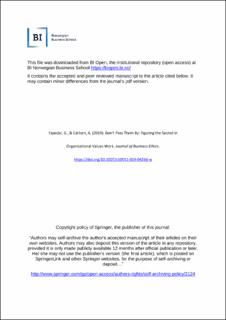Don’t Pass Them By: Figuring the Sacred in Organizational Values Work
Journal article, Peer reviewed
Accepted version

View/
Date
2019Metadata
Show full item recordCollections
- Publikasjoner fra CRIStin - BI [1015]
- Scientific articles [2181]
Abstract
How and why could some stories be construed as sacred in organizations, and what functions does the sacred have in organizational values work? Research has shown how values can be made formative of a range of organizational purposes and forms but has underscored their performative, situated, and agentic nature. We address that void by studying the sacred as a potentially salient yet under-researched realm of values work. Drawing on an ethnographic case study of a faith-based health care organization and the ethical philosophy of Paul Ricoeur, we describe how the sacred is figured in two sets of tales that were lived and told with surprising intensity and consistency: the parable of the Good Samaritan and the tale of the legacy bestowed by the organization’s founder. We theorize how this figuring of the sacred in story and in action recasts values work from a centralized and unitary process to a two-way learning dialectic between the ongoing creative imitation of action and narrative. Values in the shape of stories of the sacred do not achieve their meaning as unchangeable cores or sanctioned beliefs. Rather, they come to life in a process of ongoing moral inquiry that co-evolves with moral agencies. In the latter regard, the sacred primarily becomes manifest in everyday work in the form of questioning and creative acts of care. People become moral agents when they feel and respond to the sacred in the call of the other.